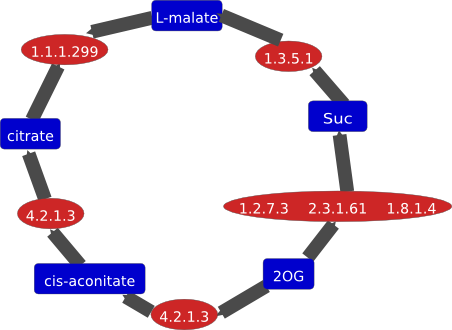EC Number   |
General Information   |
Reference   |
|---|
    1.5.5.2 1.5.5.2 | physiological function |
in trypanosomatids, L-proline is involved in a number of key processes, including energy metabolism, resistance to oxidative and nutritional stress and osmoregulation. In addition, this amino acid supports critical parasite life cycle processes by acting as an energy source, thus enabling host-cell invasion by the parasite and subsequent parasite differentiation. Proline dehydrogenase regulates redox state and respiratory metabolism in Trypanosoma cruzi, free proline accumulation constitutes a defense against oxidative imbalance |
-, 743635 |
    1.5.5.2 1.5.5.2 | physiological function |
L-proline accumulates in many plant species in response to environmental stresses. Upon relief from stress, proline is rapidly oxidized in mitochondria by proline dehydrogenase (ProDH) and then by pyrroline-5-carboxylate dehydrogenase (P5CDH, EC 1.2.1.88). ProDH1 has a role in oxidizing excess proline and transferring electrons to the respiratory chain |
741858 |
    1.5.5.2 1.5.5.2 | physiological function |
proline dehydrogenase contributes to pathogen defense in Arabidopsis thaliana. The enzyme is a defense component contributing to hypersensitive response and disease resistance, which apparently potentiates the accumulation of relative oxygen species |
726218 |
    1.5.5.2 1.5.5.2 | physiological function |
proline dehydrogenase/oxidase (PRODH/POX) is a mitochondrial protein critical to multiple stress pathways with roles in signaling, pleiotropic role of PRODH/POX in cellular energetics and signaling. PRODH/POX is a mediator of genotoxic, inflammatory, and metabolic stress signaling. Depending on cellular and environmental context, PRODH/POX can mediate programmed cell death, promote cell survival, or induce differentiation. Exposure of cells to PRODH/POX and proline results in a significant time and dependent decrease in total oxidative respiration due to PRODH/POX-dependent reactive oxygen species production. PRODH/POX has dose-dependent effect on the protein levels of individual subunits of Complexes I-IV of the electron transport chain, which is reversed with the PRODH/POX inhibitor 3,4-dehydro-L-proline and the antioxidant N-acetyl-L-cysteine |
741588 |
    1.5.5.2 1.5.5.2 | physiological function |
the JcProDH gene negatively participates in the stress response |
741642 |
    1.5.5.2 1.5.5.2 | physiological function |
transcriptional induction of the enzyme causes changes in expression levels of other mitochondrial enzymes. Activity of glutamate dehydrogenase substantially increased, indicating upregulation of the entire proline catabolic pathway |
742487 |





